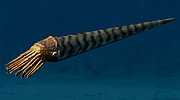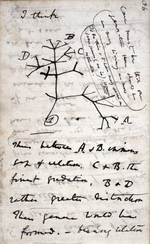the Cambrian, cephalopods are most common in shallow near-shore environments, but they have been found in deeper waters too. Cephalopods were thought to... 34 KB (3,863 words) - 17:56, 22 March 2024 |
 | Plectronoceras (category Cambrian molluscs of North America) of cephalopod evolution", in Wilbur, Karl M.; Clarke, M.R.; Trueman, E.R. (eds.), The Mollusca, vol. 12. Paleontology and neontology of Cephalopods,... 3 KB (213 words) - 10:37, 20 March 2024 |
 | Orthoceras (redirect from Orthoceras (cephalopod)) Orthoceras is a genus of extinct nautiloid cephalopod restricted to Middle Ordovician-aged marine limestones of the Baltic States and Sweden. This genus... 5 KB (437 words) - 18:48, 12 January 2024 |
 | Evolution is the change in the heritable characteristics of biological populations over successive generations. It occurs when evolutionary processes... 238 KB (24,700 words) - 04:40, 1 April 2024 |






